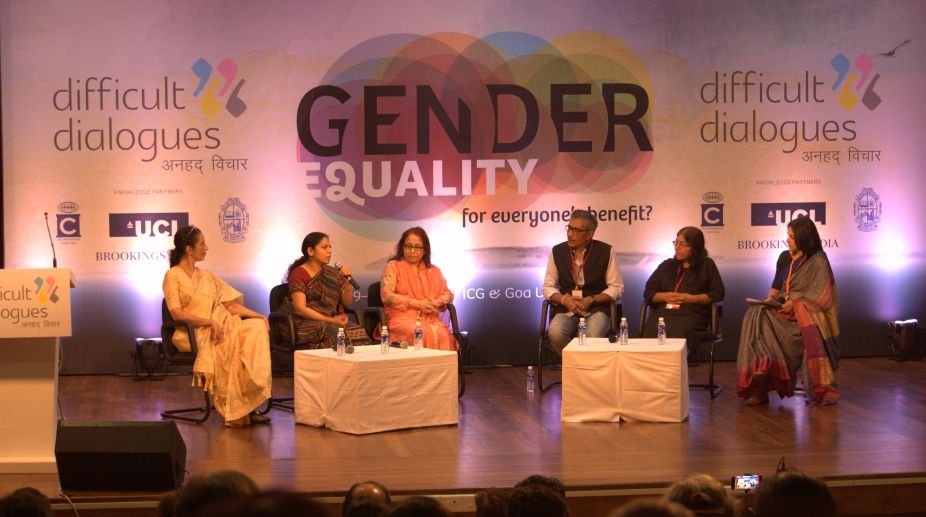Ramakrishna and his clarion call
It was 10 in the morning. At the Vedanta Math, Siliguri, a middleaged man came up to me and explained that he runs an NGO to spread awareness about cancer.

DD Life & letters
Leading international academics, policy makers, development experts, NGOs and grassroots gender workers got together in Goa for the Difficult Dialogues 2018 summit that took place from 9 to 11 February. They discussed and debated several key issues under the theme of Gender Equality – For Everyone’s Benefit?
Delivering gender equality for everyone’s benefit is a top priority for India as there has been gross inequality on the basis of gender discrimination over the years. It is this inequality that Difficult Dialogues aimed to address and the conference examined wide-ranging topics under the theme of gender equality and would now come up with white papers that could make a tangible difference. This year, the forum was held in partnership with University College London (UCL), Goa University (GU), the International Centre Goa (ICG) and Brookings India (BI).
Renowned academic experts from UCL such as Professor Sarah Hawkes who leads the UCL Centre for Global Health and Gender, Professor of Global Health David Osrin of UCL, Professor of Child and Family Policy Margaret O’Brien of UCL, and Professor of Global Health and Philosophy Sridhar Venkatapuram of King’s College London shared their vision for gender equality at the conference.
Advertisement
Attendees at the summit witnessed leading minds from academia, development experts, the media and a host of celebrities discuss new policy directions in the area of gender equality. Socio-political filmmakers Prakash Jha and Ketan Mehta, actor Nandita Das, transgender rights activist Laxmi Narayan Tripathi, LGBT rights activist Ashok Row Kavi, women’s rights activist Vrinda Grover, feminist publishers Urvashi Butalia and Ritu Menon, eminent politicians Arif M Khan, Salman Khurshid and Renuka Chowdhury, and Maharashtra’s first woman IPS officer Meeran Chaddha Borwankar, all shared their views at the event.
NGOs such as Sneha from Mumbai, PLAN India, PHIA and the Consortium for Street Children also organised panel discussions at Difficult Dialogues. UK politician and teacher Baroness Shreela Flather and actress Gabriella Wright provided insightful international perspectives to gender inequality issues in the western world.
Another interesting highlight was the initiative of the Goa University to promote gender equality through the Gender Champions programme. As part of this pioneering step, colleges under Goa University have created a team of ‘Gender Champions’ which consists of a pair of students and a faculty member with an aim to share with the rest of the students what gender really is and how equality can be achieved across the genders. These gender champions were awarded by Professor Varun Sahni, the Vice Chancellor of Goa University to encourage them to carry on with their tremendous work of sharing knowledge on gender equality.
As a finale to the proceedings Arif Mohammad Khan, former Cabinet Minister and Member of Parliament delivered a talk on ‘Why has gender equality not been achieved despite our constitutional framework’ which was well appreciated by the audience.
Commenting at the conclusion of summit, Surina Narula, founder of Difficult Dialogues said, “Delivering gender equality for everyone’s benefit is a key agenda for India and for the South Asian region as a whole. I am delighted at the range and quality of the discussions that we had on several issues related to gender equality, and the fact that we were able to identify the problem areas and recommend possible solutions. As an outcome of the Difficult Dialogues 2018 summit we will be crystallising the policy recommendations and present it to the relevant authorities and policy makers”.
Professor Sarah Hawkes academic lead of UCL added, “Disruptive thinking about difficult issues is in the DNA of UCL and we are immensely grateful to have had the opportunity to participate in and observe dialogues both difficult and demanding on what gender means to us all. Throughout the conversations it became clear that gender equality is for the benefit of all of us, everywhere.”
Advertisement